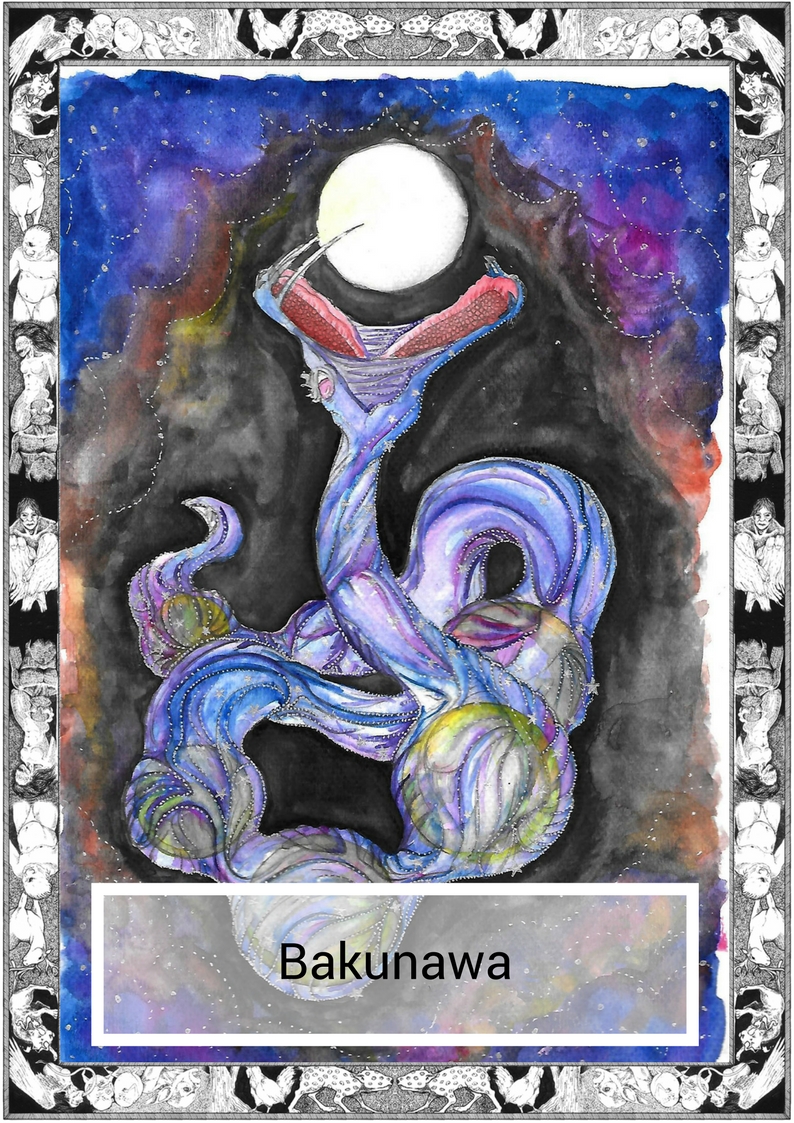
*Note this story is in Masbatenyo
Igwa`n pito na bulan, kag an bakunawa nagpalangga san pito na beses.
Gintanaw na may pagkangawa kag kaila an kada igmanghod na babayi kada labad ninda sa langit kun gabi.
San primero na gab`i, baga’n magadulom hasta na lang an langit kay gindagit san bakunawa an usad sa magmaranghod gamit an iya dako na panga kag ini iya gintulon.
Nagligad an mga adlaw kag an bulan na gintulon san bakunawa natunaw.
Dili makukuntento an bakunawa kun dili siya makaangkon san usad na bulan, kaya ginpurbaran niya utro. Pero amo gihapon, an bulan natunaw.
Si Bathala, sa iya trono sa langit, natino na dili na mapawa an mga gabi. Dili niya aram kun nano an nangyari sa inda, pero usad na gab`i nakamata siya sa siyak kag tambor san mga tawo.
Sani na oras ginapurbaran san bakunawa na tunlon an pangpito na bulan.
Nagsiyak an katawuhan agud makiaram na an ginoo, sa kahadlok na an gab`i makawat san dulom hasta na lang.
Nabatian san bakunawa an mga tambor kag siyak, kag ini dali-dali na bumalik sa iya lungga.
Napaisip san grabe an ginoo. Nano daw kun purbaran utro san bakunawa pagtulon an pangpito na bulan? Agud dili utro mangyari ini na makaharadlok na bagay, gintanuman niya san kawayan an bulan. An kawayan makikita gihapon na bagan mga balat sa iya bayhon kun siya nagalabad sa langit kun gabi.
Dili mapadaog an bakunawa. Damo na beses na sani ginpurbaran tunlon an pangpito na mannghod kag damo na beses naman ini nabigo tungod sa himo san katawuhan. An mga siyak kag mga tambor nagapatunay sa gahom san nagapamahala san kadagatan, kag siya umatras pakadto sa iya lungga agud maghulat sa masunod na tsansa.
May mga kagurangnan na nagasabi na myintras an kawayan nagatindog sa bulan, dili matutuman an gusto san bakunawa, pero an katawuhan nagabantay sa bakunawa.
Myintras gusto san bakunawa na makuha an iya premyo, pirme mababatian an nakabungol na mga tunog san tutunlan kag kamot san katawuhan.
————————–
English Version
Seven Moons there were, and seven times the great serpent fell in love.
Each sister was looked at with wonder and admiration as they passed along the night sky. The serpent thought that he must acquire these lovely beings, and sought to swallow them whole.
It was in that first night that the sky would forever be a little less brilliant, for the serpent took one of the sisters in his gaping jaws and swallowed her.
Months passed and the moon which the serpent had swallowed had melted away.
The serpent would not be satisfied unless he possessed a moon, so he tried again, but again, the moon had melted away. Six times the serpent had tried, and six times the moons melted away.
Bathala, in his throne in the skies, had noticed that the nights had lost their light. He did not know what had happened to them, but one night the screams and drums of man roused him from his sleep.
It was at that moment that the serpent was trying to swallow the seventh moon.
Humanity shouted at the great god to intercede, lest the night would forever be stolen by darkness.
The serpent heard the drums and the shouts, and retreated back to his cavern with great haste.
The great god thought hard. What if the serpent tried to swallow up the seventh moon again? To prevent this terrible thing from happening he planted a bamboo tree on the face of the moon. The tree can still be seen as a dark spot on her face when she soars through the night sky.
The serpent would not rest in defeat. Countless times has it tried to swallow up the seventh sister and countless times has it failed due to the machinations of man. The shouts and the drums prove too much for the ruler of the seas, and he retreats back to his caver, waiting on his next chance.
There are those elders that say that as long as the bamboo tree stays solid on the face of the moon the serpent will never succeed, but still mankind watches out for the serpent.
As long as the serpent seeks his prize, the deafening sounds from the throats and hands of man will be heard.
————————–
*Masbateño or Minasbate is a Bicol-Visayan language spoken by more than 600,000 people, primarily in the province of Masbate in the Philippines. It is very close to Capiznon, Hiligaynon/Ilonggo and Waray-Waray, all three spoken in Visayas. It is considered a Bisakol language, meaning a language intermediate between Visayan languages and Bicolano languages.
Written by Karl Gaverza
Masbatenyo translation by Sherwin Balbuena
Copyright © Karl Gaverza
Translation Copyright © Sherwin Balbuena
Adapted from The Moon and the Bacunawa in Philippine Folk Literature: The Myths. Eugenio. 2001.
Watercolor by Tara Singson
IG: https://www.instagram.com/
